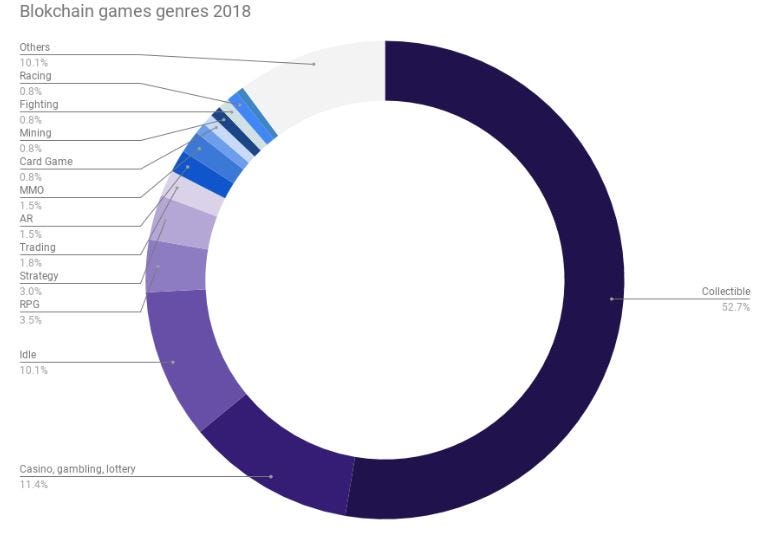Latest news about Bitcoin and all cryptocurrencies. Your daily crypto news habit.

Gaming industry is a huge market. Figures shows that it beats even movie and sports industry. Games are expected to grow from $137.9 billion in 2018 to $180.1 billion in 2021, according to Newzoo research. No surprise that blockchain also found its way to be useful (and even sort of “game changing”) here.
Blockchain pioneers in gaming
HunterCoin in 2014 was the first attempt to implement blockchain into gaming with its multiplayer battle for resources. It was more like an idea test and did get lots of users. Another early adopter was Spells of Genesis, a card-arcade game, that came to the market in 2015 and managed to raise 934 BTC (in 2015 that would be around $280k). These games opened a pass for a new generation of crypto games.
CrypoKitties phenomenon
A real breakthrough, which showed that the games are not fooling around, but really has every chance to become a serious segment of the blockchain market, was CrypoKitties epidemic in November-December 2017. CrypoKitties — a game introduced by Canadian game developer Axiom Zen, which focuses on virtual pets that can be bought, sold, and reproduced in exchange of Ethereum. Now there is a big variety of similar projects, including CryptoCuddles and KittyRacer.
CryptoKitties user base today is more that 1,5 million people with over $40 mln spent in the game. The project went viral and occupied over 30% of the transaction volume in the Ethereum network in December 2017.
What can blockchain do for gaming industry?
- Parallel universes: user will be allowed to have one character in different games thanks to blockchain distributed ledger and data verified through smart contracts. What’s even more fun — different teams will be able to join forces and create multiverse game worlds together.
- More profit with less fees: there will be new ways of buying and selling virtual items and new platforms that will allow to transact your game success into fiat. That will increase game elements economic value. Simultaneously, crypto micropayments without involving credit or debit card companies will cost cheaper in fees, which will provide better ways to monetize games as well as enable users to justify buying of items.
- Safe data and reduced scam activity: blockchain will provide safe and transparent data storage of all your data and game items. This will solve the fraud problem (1 of every 7 game item usually get lost to scammers or stolen), as stealing will become almost impossible.
- Community voting: voting features allow to build a free democracy inside every particular blockchain game. It helps to reduce influence of owners on the functioning of the game world.
- Decentralized market: Blockchain technology enable developers to collect ongoing royalties for items on trade across the gaming ecosystem.
Today’s blockchain gaming
According to blockchaingamer portal there are 395 blockchain gaming projects on the market. The most popular genre is “Collectible” with 53%, second one is “Casino, gaming, lottery” with 11%, “Idle” takes the third place with 10%.
 (Source: blockchaingamer portal data, ICOBazaar analytics)
(Source: blockchaingamer portal data, ICOBazaar analytics)
Mostly all of them are built on Ethereum platform (378), there are also games built on Bitcoin, Litecoin, NEO, Waves, EOS and others.
The top-10 gaming ICOs in 2017–2018 managed to raise over $360 mln, which is quite an impressive result.
Top-10 gaming ICO by money raised
- GameCredits/MobileGo ($53 million) — currency and virtual wallet for gamers and developers to buy and sell games and in-game items
- WAX ($46 million) — gaming item exchange platform
- Enjin ($35 million) — gaming community creation platform where users can create community websites, forums and stores to socialize and monetize their gaming experiences.
- Play2Live ($30 million) — full-blown decentralized streaming platform for gamers and esports fans
- Refereum ($28 million) — a marketing platform rewarding influencers and gamers to promote and play video games.
- Dmarket ($19 million) — gaming items trading platform
- The Abyss ($15 million) — platform for gaming dApps.
Conclusion
As you can see, for now the most successful ICOs in gaming industry are not any particular games themselves, but infrastructure or trading projects that can help to develop the market. Blockchain will give gaming industry lots of new capabilities and features. It’s still for the developers to find their way from traditional gaming to decentralized gaming. But it is obvious already that as the blockchain technology evolves, it will continue to revolutionize the gaming sector.
How blockchain is changing gaming industry was originally published in Hacker Noon on Medium, where people are continuing the conversation by highlighting and responding to this story.
Disclaimer
The views and opinions expressed in this article are solely those of the authors and do not reflect the views of Bitcoin Insider. Every investment and trading move involves risk - this is especially true for cryptocurrencies given their volatility. We strongly advise our readers to conduct their own research when making a decision.
